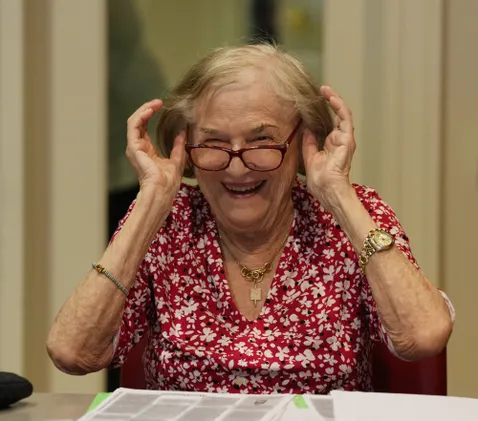Any creative person can make contributions to the fine and performing arts, as well as the humanities, at any stage in life. A woman in New Jersey has created something with extreme qualitative value.
At the age of 96, Eva Barron continues to teach her widely-received creative writing class.
When Barron taught the class years ago, it focused on high school level fiction. She has changed her syllabus and it now features autobiographical; vignettes based on her memories.
Barron launched her writing club at Arbor Terrace, the Teaneck apartment complex for seniors in New Jersey. It started three years ago, at the start of the pandemic. She enjoys the process of learning about the life experiences of contributing members.
“I thought, you know, they’ve had long and interesting lives. We all have something to contribute,” she said. “People joke that old people don’t do anything but sit around and play bingo We’ve proved them wrong.”
The class has about 10 members ranging from the age of 70 to 100. One of the members is 100-year-old, Herb Ehrlich, who fought in World War II.
Some of the members have never written before. Barron asks them to draw from their own histories.
“I did a lot of writing about laws and insurance. This is expanding your thinking,” Ehrlich said. “She really stretches your imagination with some of the topics.”
The club meets every other week. Over the years, members have learned about significant events in each other’s lives.
“This is the best thing I do here. I enjoy it very much,” said Carol Gluck, 92, who has been a member all three years. “It’s a lot of fun. It gives me something to do. It makes you work, even when you don’t want to.”
Each class is less about providing criticism of other’s works and instead is intended to spark conversation. At the end of each session, Barron asserts a homework assignment for each member.
“They take it very seriously,” Barron added. “They come about half an hour early and then stay and talk about all the stuff that comes up.
Katie Pastor, Arbor Terrace’s executive director and class member from its inception, pinpointed the program provides her with “new insight” into the lives of the local residents within the community.
“I’ve heard from people this is the most thought-provoking activity we have in this community,” she said, “Families have said how much they appreciate and treasure it. This is a legacy they are leaving-these thoughts and writings. Some of them even read their assignments to their grandchildren.”
In a recent assignment, the community members were tasked with observing a New York Times Magazine profile of Luiz Inácio “Lula” da Silva, the president of Brazil. Each member had drawn different conclusions regarding the image and discussed their findings in class through writing and discussion.
Barbara Davis, a newer member, expressed that the image made her think about her late husband.
Susan Carboni, who took Barron’s class in high school, wrote a character sketch of Christopher Carter, a 60-year-old man who was recently diagnosed with cancer, causing him to reflect on his mortality.
Carboni’s writing at the end of the piece stated the following: “Christopher is currently cancer-free. His bodily strength is somewhat recovered, and his hair is growing back. He has returned to work. But his mind is still coming to grips with that question: what’s it all about? How can I live, grow, learn, suffer, love, hate…and then simply cease to exist?”
“And there is no answer,” Barron said after a beat. “That’s a whole short story; now you can try a novel. It’s amazing, really-we have one photographer, and this is what people come up with.”
Barron ensures that each assignment is different. She gets her ideas from newspaper articles, current events and poetry.
“I get my best ideas before I go to sleep,” she said.
Some previous topics include memories of childhood toys, neighborhoods, music and dinner parties. One of her favorite assignments was inspired by Robert Frost’s poem “The Road Not Taken.”
“Their work is based on a life of marriage, children, divorce and whatever else happens. It comes out different, but it’s fun to see,” she said. “They do terrific stuff.” This story is an example of how community members can unite in order to learn things about life through the expression of writing and dialogue. When most people think of a creative writing class, they may predict it is going to be taught in a mundane fashion. However, Barron’s teaching and leadership style is far from it; she has identified a method to encourage people to express themselves and show an appreciation for others. Everyone has something positive to contribute to life, and Barron’s class can be a parading for other communities to follow.
